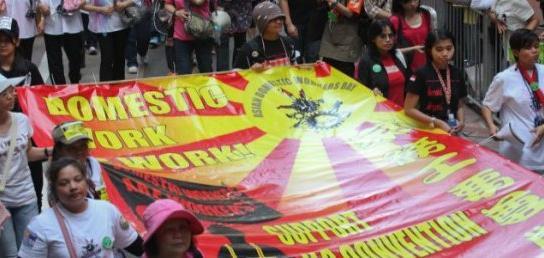Brussels, 16 June 2011: The International Trade Union Confederation today welcomed the historical adoption of the Domestic Workers Convention and Recommendation by the International Labour Organisation, but called on the ILO to ensure governments around the world were put on notice about protecting the millions of people in the domestic work sphere.
With many millions of migrant workers in domestic labor around the world, the ITUC said that without proper monitoring, these workers would continue to suffer violent and oppressive employment conditions, exploitative recruitment agencies, remuneration below legal minimums, nonpayment of wages, exclusion from social security schemes, excessive working hours, and the worst forms of child domestic labour .
“The adoption of this Convention is a great victory, and we call upon all governments to ratify and implement it and upon the ILO to provide clear guidance to these countries that need to improve their laws to protect domestic workers’ rights in their economies,” General Secretary of the ITUC, Ms. Sharan Burrow, said.
The ITUC has reported on widespread oppression and violence against migrant domestic workers in the Gulf. These migrant women workers come mainly from India, Bangladesh, Sri Lanka, the Philippines, Indonesia and Ethiopia.
“The international union movement will continue to shed light on the working conditions of migrant domestic workers in the Gulf Countries, in particular Saudi Arabia, the UAE, Qatar and Bahrain,” Ms. Burrow said.
“It is not acceptable that in countries with strong economies and a lot of personal wealth, we have an underclass of domestic slaves, whose passports are taken when they arrive, and who have no one to turn to if their employer treats them with violence or harassment,” Ms. Burrow said.
Ms Burrow called on the ILO to develop an action plan specifically for the monitoring of the implementation of the Convention in the Gulf.
There are an estimated 2.1 million migrant domestic workers, 83% are women and it is estimated that in total, domestic work accounts for no less than 7.5 per cent of female wage employment worldwide.
“Finally, domestic workers are recognised as ‘workers’. Their long-standing demands for equal treatment with other workers are now embedded in the Convention and Recommendation. It is not a day too early. The IUF, which is the global union federation for food, hotel and allied workers, along with the International Domestic Workers’ Network welcome the good spirit in which the final negotiations were carried out. We now call upon all governments to put into law and practice what the Convention contains. This would change the lives of millions of domestic workers and their families for the better”, says IUF General Secretary, Ron Oswald.
Welcoming the adoption of the Convention and Recommendations Peter Waldorff, General Secretary of Public Services International, says, “Millions of workers, mainly women, provide care services daily to vulnerable people in their homes – services which should be provided by the State. These workers are often part of an invisible workforce with little or no legal protections. This Convention should help rectify this appalling situation and we call on Governments to ratify and implement it without delay”.
The Convention on Domestic Workers passed today at the International Labour Organisation, after many years of campaigning by unions, migrants’ and women’s organisations around the world, is a benchmark: it is a key instrument to ensure that workers in informal and precarious jobs have an effective access to decent work.
About the Convention:
The Convention gives the millions of domestic workers around the world the same rights as other workers. Until now, most domestic workers belonged to what is called the informal economy. Once ratified, this Convention has the potential to take millions of workers out of the shadow economy and formalise their employment. The Convention, first and foremost, recognises the right of domestic workers to organise in unions, which is still forbidden in many countries. This change should allow them to negotiate and improve their working conditions.
For more information on the Convention, see the spotlight interview with Marieke Koning (ITUC-Equality) at: http://www.ituc-csi.org/spotlight-interview-with-marieke.html
See related ITUC publications:
- ITUC Action Guide on Domestic Workers
- Living in Economic Insecurity: Women in Precarious Forms of Work
This post originally appeared on the International Trade Union Confederation website



